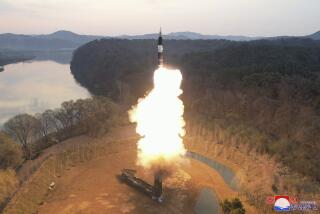Op-Ed: Trump, Kim and the Hanoi summit — at best, a peace mirage
Talk of a Nobel Peace Prize for President Trump, commonplace among his supporters before his first summit in Singapore with North Korean leader Kim Jong Un, has been revived in advance of their second summit, in Hanoi this week. Indeed, the Japanese news media have reported that Trump asked Prime Minister Shinzo Abe to nominate him. But will the summit produce a breakthrough for peace or merely a peace mirage?
We must all hope for the former, but it’s more likely to be the latter. Despite his rhetoric about committing to “denuclearization,” Kim has made clear in his actions that he is not going to give up his nuclear stockpile. He considers nuclear weapons essential for his regime’s survival.
Kim has, in fact, beefed up his nuclear and missile arsenals since the Singapore summit. He has not fully declared his nuclear and missile programs, which would be the first step toward an actual disarmament. Trump, for his part, has been pulling back from his demands for complete denuclearization. He’s in “no rush,” he told reporters last week, as long as North Korea doesn’t conduct more nuclear or missile tests.
An ill-conceived “peace declaration” could set in motion a too-hasty peace treaty.
Any gains made in Hanoi are likely to be symbolic — North Korea might agree to disable part of its aging nuclear facility at Yongbyon and Trump might agree to some easing of sanctions, a further moratorium on military exercises with South Korea, and the issuance of a not-legally-binding “peace declaration” ending the Korean War.
The “peace declaration” sounds innocuous — a simple recognition that the Korean War ended in 1953. Aside from sporadic clashes between North and South, principally acts of terrorism perpetrated by the North, there have been no large-scale hostilities since. So why not “declare” peace?
The problem is that an ill-conceived “peace declaration” could set in motion a too-hasty peace treaty. If South and North Korea were to enter into a formal of state of peace, what would be the rationale for keeping 28,000 U.S. troops in South Korea? Until North Korea gives up its weapons of mass destruction, withdrawing U.S. troops — and with them the nuclear umbrella that protects South Korea — would be a mistake.
Although recent polls show that most South Koreans continue to support a U.S. military presence, in the wake of a treaty or even a peace declaration, Americans and South Koreans could question the need for them. The danger of an American withdrawal is already substantial because Trump views the stationing of U.S. troops in wealthy countries such as South Korea as a rip-off of American taxpayers. The U.S. and South Korea have just reached a one-year agreement on a cost-sharing deal for U.S. troops that will increase the subsidy offered by Seoul from $864 million to $920 million. But the negotiations for next year must begin soon — and there is no guarantee that they will result in another agreement.
If the president does agree to a peace declaration, it should come with proportionate “gets” from North Korea, concessions that go beyond ritualistic and undefined pledges to somehow, someday “denuclearize.” Listing the location of North Korea’s nuclear facilities and weapons would be a credible and meaningful step.
Enter the Fray: First takes on the news of the minute »
At minimum, if there is going to be a peace declaration, there must be a clear agreement with North Korea that a war-ending declaration does not change the status quo on the peninsula — including the DMZ, the United Nations Command, and the U.S.-South Korea Combined Forces Command — and is not incompatible with the continuing presence of U.S. troops. Such a statement would need a proviso that the armistice stays put until a formal peace treaty supplants it.
The situation with North Korea is not analogous to America’s relationship with Japan and Germany after those nations were defeated in World War II. Nor is it analogous to the situation between the U.S. and North Vietnam after the Vietnam War when we were defeated. North Korea remains undefeated and defiant — and from its perspective it continues to face an existential threat from a richer and freer rival to the south. North Korea wants as much economic normalization as possible without actually giving up the nuclear and missile programs that, in Kim’s view, guarantee his regime’s survival — and his own.
Don’t open the Champagne yet; the Nobel Peace Prize is still a long way off.
Sue Mi Terry is senior fellow for Korea at the Center for Strategic and International Studies. She was a senior analyst on Korean issues at the CIA and director for Korea, Japan and Oceanic Affairs at the National Security Council.
Follow the Opinion section on Twitter @latimesopinionand Facebook
More to Read
A cure for the common opinion
Get thought-provoking perspectives with our weekly newsletter.
You may occasionally receive promotional content from the Los Angeles Times.





